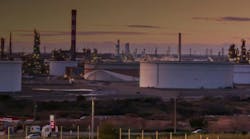David Nakamura
Refining/Petrochemical Editor
SAN ANTONIO, Mar. 23 -- The US refining industry this year has maintained a delicate balance between supply and demand for gasoline products during difficult situations, says National Petrochemical & Refiners Association Chairman D. Duane Gilliam.
Gilliam, executive vice president, corporate affairs, Marathon Ashland Petroleum LLC, made the comment at NPRA's 101st annual meeting here Sunday.
Supply concerns
"Given uncertainty about the duration of the war in Iraq, we are confronting tough times and complex challenges," Gilliam said. "The refining and petrochemical industries will work to maintain adequate supplies of product throughout these hostilities. We believe that those supplies will be available."
Gilliam said that the recent run-up in gasoline prices is a good example of the growing anxiety about crude supplies.
He said, however that ". . .supplies should remain adequate despite a crude oil market under pressure and relatively high demand as refiners prepare to meet summer US gasoline specifications."
US refiners still face a number of challenges looking further into the future, including new legislation, new fuel requirements, and the New Source Review requirements of the Clean Air Act.
"The challenge for this industry is meeting the new fuel requirements: the lower sulfur required for gasoline, the lower sulfur levels for onroad diesel fuel, and being studied (by the Environmental Protection Agency) right now is the low-sulfur requirements for offroad diesel," Gilliam said. "I think that is the real challenge: Can we (refiners) spend the tremendous amount of capital required. . .for this industry to put in the facilities to make low-sulfur gasoline and diesel fuel?
"Some of the current estimates (to comply with low-sulfur regulations) are approximately $16 billion. As we move forward and put in the new equipment, I think only time will tell what the actual cost will be," Gilliam said.
Shutdowns ahead?
Refiners will have to comply with all these new rules and specifications with the possibility of losing some capacity because some refiners will choose not to make the investments.
"There is a consensus of opinion that we will lose some facilities, and there is a question as to how much that will actually be," said Bob Slaughter, NPRA president. "There may be some plants that will be unable to deal with the cost for additional desulfurization when (the rules) eventually occur."
Slaughter also raised the possibility that one refinery that was shut down in 2002 may be sold and possibly restarted.
Capacity creep, Gilliam said, will also offset the loss of capacity from a refinery shutdown.
"When we take a refinery down to construct clean fuel equipment, often (US refiners) will choose to expand the refinery slightly. We truly believe that will continue into the future. Some capacity will be added; some capacity will be shut down."

